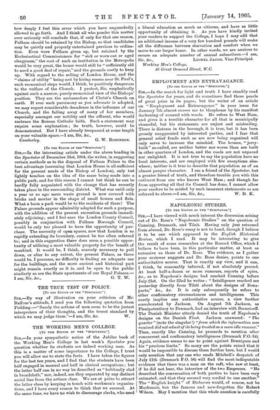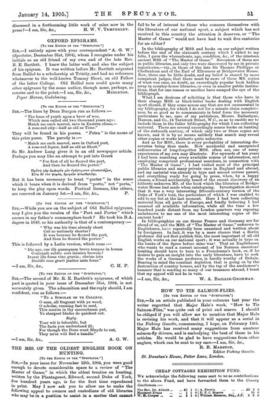Sxn,—I have viewed with much interest the discussion arising out
of Dr. Rose's " Napoleonic Studies " on the question of Canning, Denmark, and Tilsit. Having only just returned from abroad, Dr. Rose's essay is not to hand, though I believe it to be one which appeared in the English Historical Review, which I read. It may be interesting to give the result of some researches at the Record Office, which I believe to have been, in this particular matter, at least as extensive as those of Dr. Rose. The evidence, as I gather your reviewer suggests and Dr. Rose denies, points to one authoritative source. That is exactly my view, and it can, I think, be reasonably inferred, if not absolutely proved. At least half-a-dozen or more rumours, reports of spies, &c., as to Napoleon's designs had reached Canning before July 21st. On the 22nd he writes : " Intelligence reached me yesterday directly from Tilsit about the designs of Bona- parte," &c., &c. It is only subsequently he refers to other confirmatory circumstances and intelligences. This surely implies one authoritative source, a view further corroborated by Jackson. On August 7th Jackson, as Plenipotentiary to Denmark, had an interview with Bernstorff. The Danish Minister utterly denied the truth of Napoleon's designs on the Danish Fleet. Jackson answered: " The quarter" (note the singular !) "from which the information was received did not admit of its being treated as a mere idle rumour." Then, exactly like Canning, he proceeds to mention other concurrent and confirmatory intelligences (Denmark F.0.54). Again, evidence seems to me to point against Bennigsen and his " precious limits." So many are the points raised that it would be impossible to discuss them further here, but I would only mention that any one who reads Mitchell's despatch of July 11th (Denmark F.O. 56) will find the most indisputable evidence that there was a man on the raft, who saw at least, if he did not hear, the interview of the two Emperors. "He described the conversation of both parties to have been very animated, and that they seemed very cordial to one another.' The " English knight" of Disbrowe would, of course, not be Mackenzie, but the famous and now-forgotten Sir Robert Wilson. May I 'mention that this whole Question is carefully
press ?—I am, Sir, &c., H. W. V. TEMPERLEY.







































 Previous page
Previous page